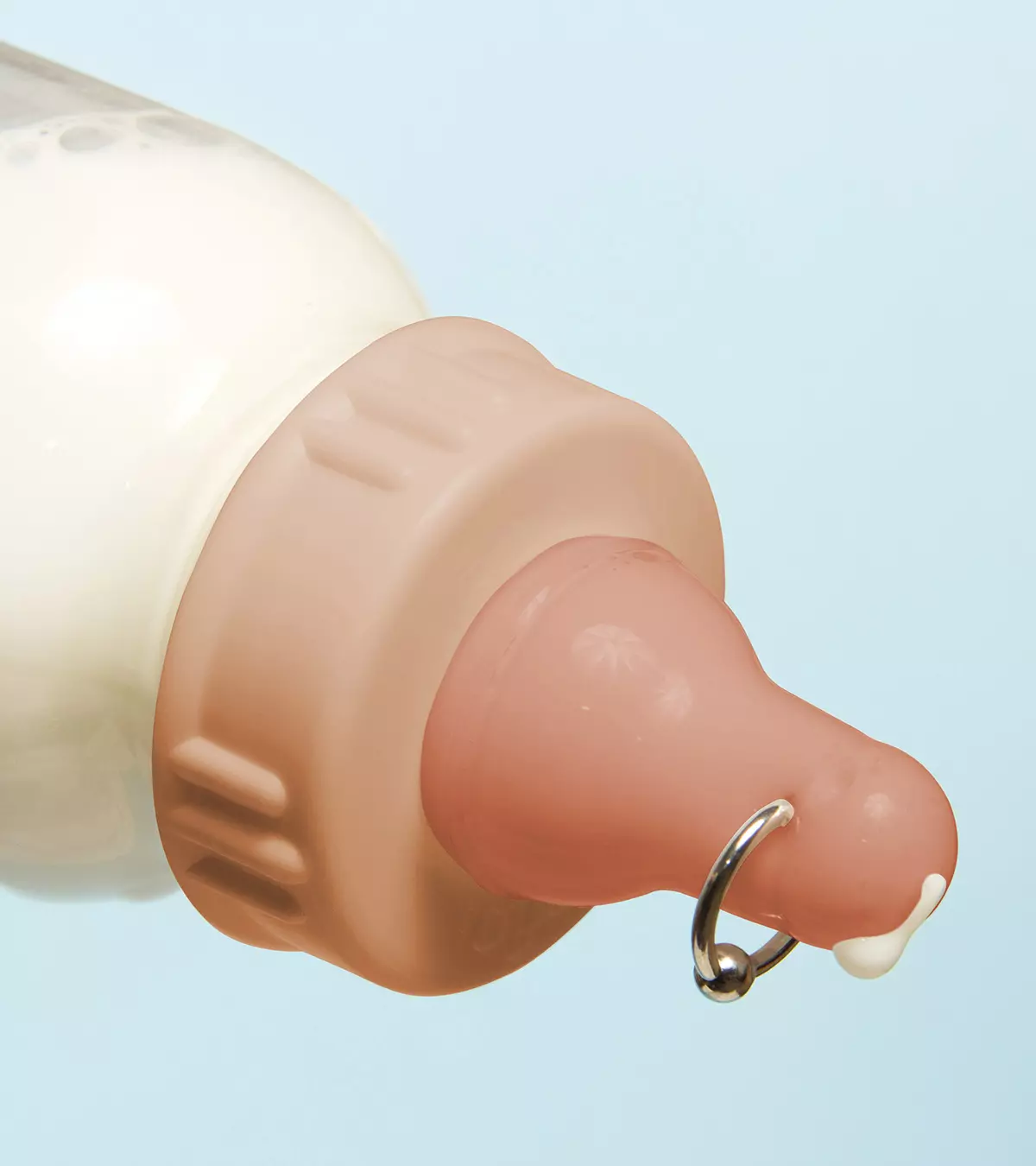
Image: iStock
Breast milk should be the only source of nourishment for a baby for the first six months. For this to happen, you need to have enough milk supply. If you aren’t having enough, then how to increase breast milk supply? To ensure a good milk flow, mothers should start breastfeeding at the earliest and continue frequent nursing. Good baby latching also ensures effective milk flow. New mothers usually produce sufficient milk. However, if you have been facing issues, this post will help you establish a normal milk supply (1).
Key Pointers
- Insufficient breast milk supply is not common and may occur due to intake of birth control pills, alcohol intake, breast surgery, or infections, among a few reasons.
- You may have a lack of breast milk if you notice your baby keeps losing weight, passes dark urine, and does not feed for long.
- Home remedies such as maintaining a balanced diet, massaging, using a breast pump, or taking doctor-prescribed medication may help increase the supply.
How To Know If Your Milk Supply Is Low?

Here are some signs that alert the mother to a low milk supply (2) (3) (11):
- Sleep and weight issues: A well-fed baby gains weight consistently after the first two weeks and sleeps undisturbed between feedings. However, monitor the baby’s feed if they are losing weight past the two-week mark or not gaining an adequate amount of weight per your pediatrician’s examination. A hungry baby may also not sleep long enough and show signs of overtiredness.
- Inadequate output: An adequately fed baby produces as many as six or more heavily wet diapers every 24 hours after the first five days. Some babies may also pass two small poops per day. However, if the baby is producing less than the expected number of wet and dirty diapers for their age, even after a week after birth, this may warrant medical evaluation.
- Dehydration: A baby’s mouth may appear moist after a satiating feed. They may seem happy, relaxed, and content. Additionally, they may show signs of alertness by actively responding to their surroundings. However, a baby not feeding adequately may start showing dehydration signs, such as dry mouth, dark and smelly urine, jaundice, tiredness or lethargy, and irritability. In severe cases, they may have less or no tears when crying and have a sunken fontanelleiThe soft pulsing spot on top of the baby's head (12).
- Frequent feeding demands: Babies tend to feed between 8 and 12 times per day once the mother achieves full supply. These feeds may be characterized by rapid and rhythmic suckling and noticeable swallowing with occasional pauses. The baby may feed until satiated and let go of the breast themselves without fuss. However, in cases of low supply, the baby may not feed for long or demand feedings too frequently. They may also frequently unlatch from the breast and appear unsettled or fussy.
It is important to note that these signs may not appear suddenly and do not always indicate a total deficit in supply. Mothers may still be able to feed their babies and work on gradually increasing their milk production while they identify the underlying cause of the low supply.
What Are The Causes Of Low Milk Supply?

Some possible causes that can lead to low milk supply in mothers (3) (13) (14):
- Oral contraceptives containing estrogen may cause bodily imbalances resulting in low milk supply.
- Smoking and alcohol intake can also affect the amount of milk supply in a mother.
- Recent mastitis (infection of breast tissue) may cause a low milk supply.
- Breast surgery can impact the creation and supply of milk.
- Scheduled breastfeeding or timed feeds that lead to a lack of breast stimulation.
- Inability of the baby to consume breast milk effectively due to an illness or a stuffy nose.
- Baby not feeding at frequent intervals or less than eight times a day in the first month after birth.
- Inability to latch properly to the breast due to flat nipples or orofacial deformities such as tongue or lip tie and cleft palate in the baby, causing pain and damage to the nipples.
- Mother not eating enough food to sustain her supply or is dehydrated.
- Over-the-counter medications and herbal supplements for colds, flu, diarrhea, vomiting, and other illnesses may affect milk supply.
- Alternating intermittent feedings or supplementing frequently with formula and breastmilk may cause the breasts to underproduce the milk.
- More than 1000ml of blood loss after delivery or postpartum hemorrhage may cause a drop in milk supply.
- Stress, anxiety, and postpartum depression may affect the supply. According to obstetrician and gynecologist Shivani Patel, “Stress is the no.1 killer of breastmilk supply, especially in the first few weeks after delivery. Between lack of sleep and adjusting to the baby’s schedule, rising levels of certain hormones such as cortisol can dramatically reduce your milk supply (8).”
Existing health issues, such as anemia, thyroid disorders, diabetes, high blood pressure, polycystic ovarian syndrome (PCOS), obesity, or retained placenta, can also be the reasons for low milk supply, but they are rare.
 Did you know?
Did you know?How To Increase Breast Milk Supply?
If the mother cannot create sufficient milk for the baby, she should be encouraged to follow basic measures such as good hydration and diet, gently massaging the breast before latching the baby, limiting caffeine consumption to 200mg per day, quitting smoking and avoiding alcohol consumption.
In her blog, Amber, a mother and dietitian, shares what helped boost her milk supply. She says, “I could tell in my milk supply when I didn’t drink enough throughout the day. I made sure to drink at least 100mL of water per day, not including the water I get from fruits, vegetables, and other food sources.”
Here are some other tips to help the mother increase milk supply (4):
- Pumping: This involves the use of a manual or electric breast pump or learning to hand express. The mother is advised to pump when she feels her supply is at its best – usually between midnight and 8am. She can pump from both breasts and should not expect to be able to pump as much as the baby takes from a bottle initially. Ten minutes on each breast would be a good starting point. Increased breast milk demand increases supply. Try wearing a well-fitted nursing bra to support the breasts. A tight-fitting bra may block the milk ducts or decrease milk supply, thus hindering the pumping process.

- Foods: Consuming fruits and vegetables, whole-grain products, low-fat milk, cheese, yogurt, and protein-based foods can help. Incorporating foods that increase breast milk into your diet is key to ensuring both mother and baby receive the necessary nourishment. A balanced diet focuses on providing high nutritional value and can improve milk supply.
Bryannah Kay, a mom of three, shares how adding sweet potatoes to her diet helped increase her breast milk supply. She says, “I’ve noticed that sweet potatoes seem to boost my milk supply. I can’t say for sure if it’s a proven thing, but I’ve developed a routine. I prepare sweet potatoes in the crockpot every Sunday, so I always have a stash of ready-to-eat sweet potatoes. I use them in various ways, like adding chicken or enjoying them with eggs for a quick, convenient meal (ii).”
It is essential to note that certain foods are believed to help increase breast milk supply. However, the scientific evidence supporting the effectiveness of these foods is scarce, and their impact on breast milk supply can vary from one mother to another. Hence, consuming a well-balanced diet containing various foods is advisable.
- Herbal supplements: Also known as galactagogues, these herbs for breastfeeding show an effective increase in milk supply in some women. An online survey was conducted on 1,294 breastfeeding women in the US. According to the survey results published in the Journal of the Academy of Nutrition and Dietetics, about 27.7% of the nursing women reported using herbal supplements as galactagogues (15). The most commonly used supplement is fenugreek but there are also risks which should be taken into consideration (5). Additionally, blessed thistle and fennel are purported galactagogues but more clinical studies are required to ascertain their roles in increasing milk supply.

- Essential oils: Although there is no evidence-based research to support its use, basil essential oil may improve the overall health of the mother, which in turn, could improve her supply of milk. You should always use it with a carrier oil to dilute its strength (2).
- Medication: Healthcare professionals might prescribe certain medications, such as Domperidone, to increase the supply of milk. Make sure you discuss both the benefits and risks of any medication with your care provider.
In addition to the above-mentioned tips, the markets also sell lactation cookies containing oatmeal or oats that are believed to work as galactagogues. Medicines are often considered for their convenience by mothers, but understanding which ones to take and being aware of their potential side effects is crucial. Therefore, you should consult your lactation specialist before consuming them to know about their safety.
 Quick tip
Quick tipAre There Any Medications To Increase Breast Milk?
Some medicines may help increase the breast milk supply. If necessary, a doctor may prescribe them (6) (7):
- Metoclopramide: It is a gastrointestinal drug that can be used as galactagogues. A few studies state that this medication can boost breast milk production by 66 to 100% in just a few days. Nevertheless, if stopped suddenly, it comes with adverse effects and a notable decrease in breast milk production.
- Domperidone: It is a peripheral dopamine antagonist that has efficacy similar to metoclopramide and is known to increase breast milk supply.
Note: The US Food and Drug Administration (US FDA) has not approved these drugs for boosting breast milk production. Therefore, you must consume them only when prescribed by the healthcare provider to avoid their potential side effects. Following a comprehensive evaluation of your breast milk production and a thoughtful consideration of the benefits and risks, your doctor might recommend the ‘off-label’ use of one of these medications as a galactagogue.

Frequently Asked Questions
1. Can water increase breast milk?
Hydration is essential to have good milk production. Following a routine of drinking a glass of water after nursing may show a boost in the milk supply during the next pumping (8).
2. What fruits to avoid while breastfeeding?
It is not known which fruits are strictly to be avoided for lactating mothers. However, it is best to exercise moderation and not go overboard with any fruits. Your nutritionist or doctor may suggest the safest choices to you based on your overall health and well being.
3. Do bananas increase breast milk?
No. Although some may believe that specific food items such as bananas might increase milk production, there is no scientific evidence to prove that (9).
4. Can lack of sleep affect milk supply?
Yes. Sleep schedule plays a vital role in breast milk production since stress from lack of sleep can increase levels of hormones such as cortisol, which in turn may reduce the milk supply (8).
Continued breastfeeding to babies up to at least six months is essential for their optimum growth and development. Hence, knowing how to increase milk supply can help mothers experiencing low breast milk supply. To improve breast milk supply, you should know the precise cause of low supply. For that, you need to consult your doctor or a lactation expert. Once the exact cause for poor or low milk supply is determined, your healthcare provider can guide you to the appropriate way to improve your breast milk supply.
Infographic: Possible Reasons Why A Woman Has Inadequate Milk Supply
Breast milk is a vital source of nutrition for newborns, but some women may experience challenges with a low milk supply. The below infographic provides insights into potential causes of low breast milk supply. Understanding these causes can help women identify and address the underlying issues.

Illustration: Momjunction Design Team
Illustration: Helpful Ways To Increase Breast Milk Supply

Image: Stable Diffusion/MomJunction Design Team
Personal Experience: Source
MomJunction articles include first-hand experiences to provide you with better insights through real-life narratives. Here are the sources of personal accounts referenced in this article.
i. Breast Feeding, Pumping, & Being a Working Mom;https://themasseyspot.blogspot.com/2014/05/breast-feeding-pumping-being-working-mom.html
ii. Increase Breastmilk Supply| Easy Tips From An Exclusively Pumping Mom;
https://www.youtube.com/watch?v=foiA7V03Ndc&feature=youtu.be
References
- Increasing Your Breast Milk Supply.
https://www.pregnancybirthbaby.org.au/increasing-your-breast-milk-supply - Do I Have A Low Milk Supply?
https://americanpregnancy.org/healthy-pregnancy/breastfeeding/low-milk-supply/ - Low Milk Supply.
https://www.thewomens.org.au/health-information/breastfeeding/breastfeeding-problems/low-milk-supply - Increasing Your Breast Milk Supply Fact Sheet.
https://www.childrens.health.qld.gov.au/fact-sheet-increasing-your-breast-milk-supply - Galactagogues-Boosting Your Milk Supply.
https://americanpregnancy.org/healthy-pregnancy/breastfeeding/galactagogues-boosting-your-milk-supply/ - Increasing Breast Milk Supply.
https://www.med.umich.edu/1libr/Gyn/Lactation/IncreasingMilkSupply.pdf - Michael P Gabay; (2002); Galactogogues: medications that induce lactation.
https://pubmed.ncbi.nlm.nih.gov/12192964/ - 4 factors that can decrease breast milk supply – and how to replenish it.
https://utswmed.org/medblog/decrease-breast-milk-supply/ - 5 Breastfeeding Diet Myths.
https://www.hopkinsmedicine.org/health/wellness-and-prevention/5-breastfeeding-diet-myths - Low Milk Supply.
https://www.chop.edu/centers-programs/breastfeeding-and-lactation-program/low-milk-supply - Breastfeeding: is my baby getting enough milk?
https://www.nhs.uk/conditions/baby/breastfeeding-and-bottle-feeding/breastfeeding-problems/enough-milk/ - Dehydration.
https://www.nhs.uk/conditions/dehydration/ - 4 factors that can decrease breast milk supply – and how to replenish it.
https://utswmed.org/medblog/decrease-breast-milk-supply/ - Low Milk Supply.
https://www.chop.edu/centers-programs/breastfeeding-and-lactation-program/low-milk-supply - Rachel A. Ryan et al.; (2023); Use of Galactagogues to Increase Milk Production Among Breastfeeding Mothers in the United States: A Descriptive Study.
https://www.jandonline.org/article/S2212-2672(23)00279-4/fulltext
Community Experiences
Join the conversation and become a part of our nurturing community! Share your stories, experiences, and insights to connect with fellow parents.
Read full bio of Mindy Cockeram
Read full bio of Dr. Ritika Shah
Read full bio of Rohit Garoo
Read full bio of Vidya Tadapatri























